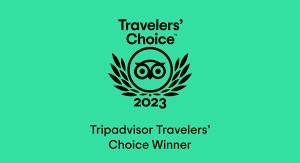Basic Vietnamese Phrases You Should Remember When Traveling
Nowadays foreigners come to Vietnam to travel and living has increased over the years. To be able to communicate with the local people in the remote areas who can only speak Vietnamese, you should learn Basic Vietnamese Phrases for a great visit.
Learn Basic Vietnamese Phrases for your incredible tour
In addition to being able to communicate more easily with locals, knowing basic Vietnamese words also makes you more professional and knowledgeable when joining motorbike tours in Vietnam. Like other languages, Vietnamese has many different pronunciations for words. Check out the information below to learn more about Vietnamese!

Learning Basic Vietnamese Phrases for your great trip
Basic knowledge of Vietnam
Vietnam is a nation in Southeast Asia that has a long and rich history and culture. Vietnam’s culture is influenced by various sources, such as China, France, and the United States so the Vietnamese accent will be different in each region of Vietnam.
The nation and language
Due to the influence of many different countries in the world, the pronunciation of each region is also different. Besides, Vietnam is divided into 3 main regions: North, Central and South, each region will have its own characteristics in pronunciation, which creates a special feature of Vietnam’s culture. To explore the beauty of the three main regions, contact us to immerse yourself in nature with North Vietnam Motorbike Tours, South Vietnam Motorbike Tours, Central Vietnam Motorbike Tours.
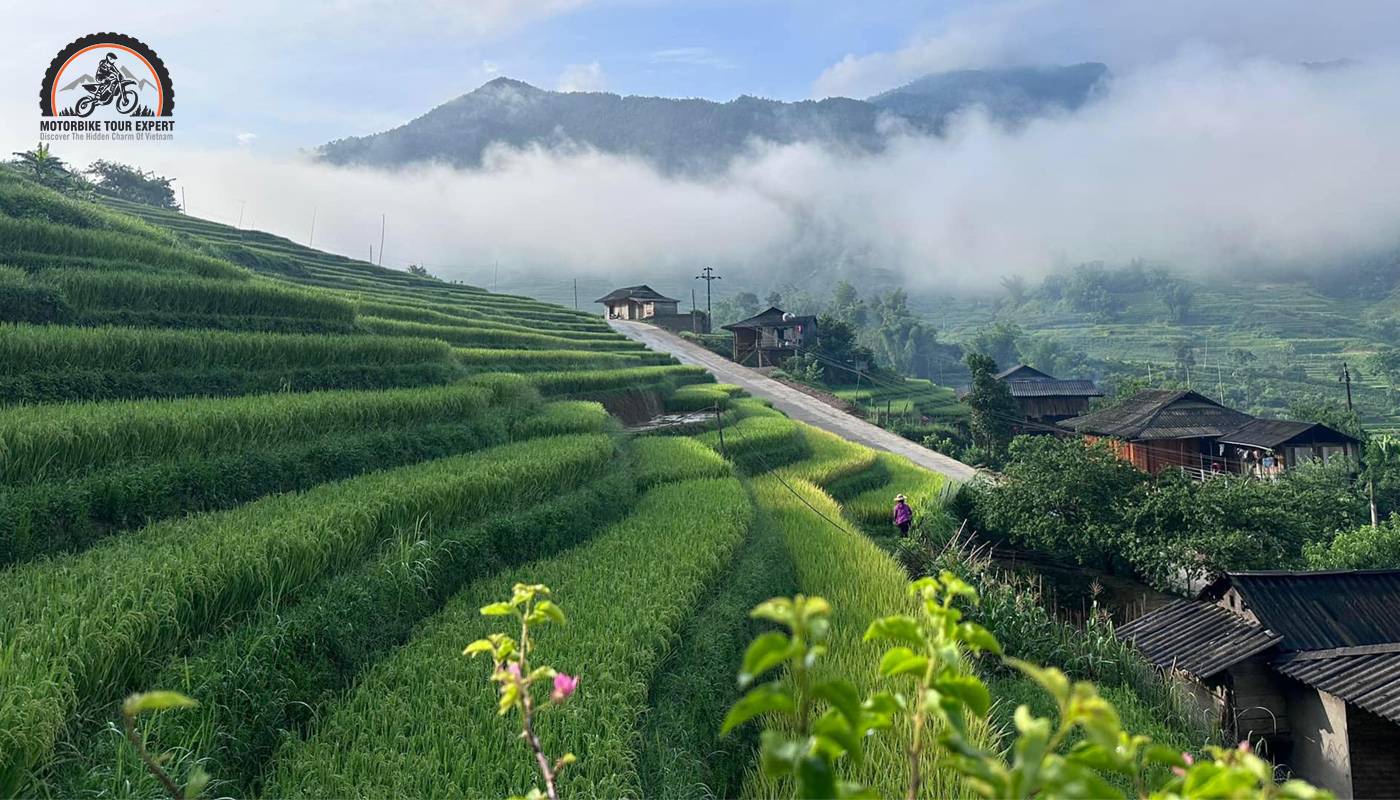
Vietnam is a beautiful nation that has a long and rich history
The different accents between 3 regions of Vietnam
The information below will give you the pronunciation of all 3 regions and their special features.
- For Northern Vietnam: Pronunciation seems to be heavier and clearer. For example, people in the North usually pronounce the “l” and “n”; “gi”, “d” and as the same while people in the Central and South usually distinguish them more clearly.
- For the Central people: They make Acute accents into Grave accents while Underdot becomes Grave ones.
- For the South of Vietnam: Southerners pronounce the letter “gi” as same as the letter “d” and they make the sound of the Tilde accents as same as the Hook above accents.
In addition, in each region, there will be different local words and the use of words is different to refer to the same objects. All those things make the Vietnamese language diverse.
The difference between addressing people in English and Vietnamese
In England or other English speaking countries, people use the same pronouns for “I”, “you”, “he”, and “she” regardless of age or status. While in Vietnam, we have a lot of ways to call someone.
Typically as in English, people use the same word for “uncle” or “aunt” regardless of whether they are related by blood or marriage. For example, Uncle Harry, and Aunt Tracy. In Vietnamese, people use different words for “uncle” or “aunt” depending on whether they are related by blood or familiarity with the Vietnamese person you are talking to.
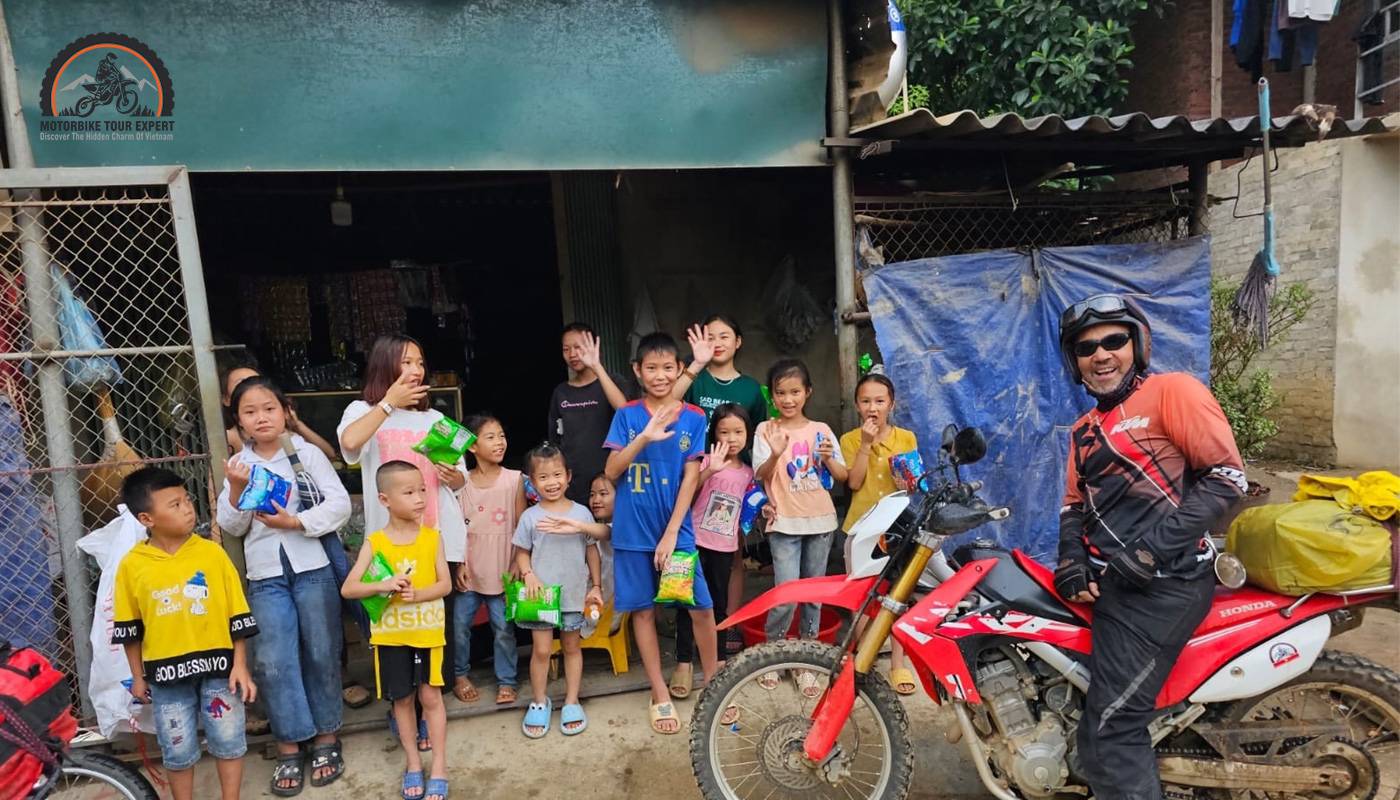
There are a lots of way to addressing people here
How to address people here
Vietnamese people use different pronouns for “I”, “you”, “he”, and “she” depending on the situation and the person you are talking to. For example, “Tôi” or “Tui” (in the South of Vietnam) means I and is used when talking to strangers. “Em” means younger sibling and is used for people who are younger than the person that they talk to or when talking to their lovers.
Addressing people is considered one of the hardest parts of communication in Vietnam. There are a lot of ways to call someone based on age, gender, and relationships. You can check the table below for basic Vietnamese phrases to address someone in Vietnam.
| Addressing yourself | English means |
| – Toi, to, tui (talking to a friend or one who same age with you).
– Em (talking to an older person, like a brother/sister) – Anh/Chi (Talking to the younger than yourself). |
I (me) |
| Calling someone | Towards |
| Em | Calling the one who is younger than you. |
| Anh (Male) / Chi (Female) | Calling the one who is older than you. |
| Co (Female) / Chu (Male) | Towards to those who are younger than your parents. |
| Bac | Towards who is older than your parents. |
| Ong (Male) / Ba (Female) | Towards ones the same age as your grandparents. |
Basic Vietnamese phrases for foreign tourists in each situation
Vietnam is a beautiful and hospitable country, Vietnamese people are willing to help or have a chat with foreigners. We’ll inform you of common Vietnamese phrases in different situations below to communicate easily and have a great trip.
For Greetings
The most common way to say hello in Vietnam is “Xin chào” or “Chào” (a little bit the same as Italian). It’s a versatile phrase that can be used at any time of the day and with anyone. In another way, you can address people naturally by calling someone following the table above.
When saying goodbye to Vietnamese, you can use different phrases depending on the situation. For example, you can say “Tạm biệt” which means “Goodbye”, or simply say “Bai” which means the same pronunciation and meaning as “Bye” in English.
Those are some Basic Vietnamese Phrases for riders to greet in Vietnam.
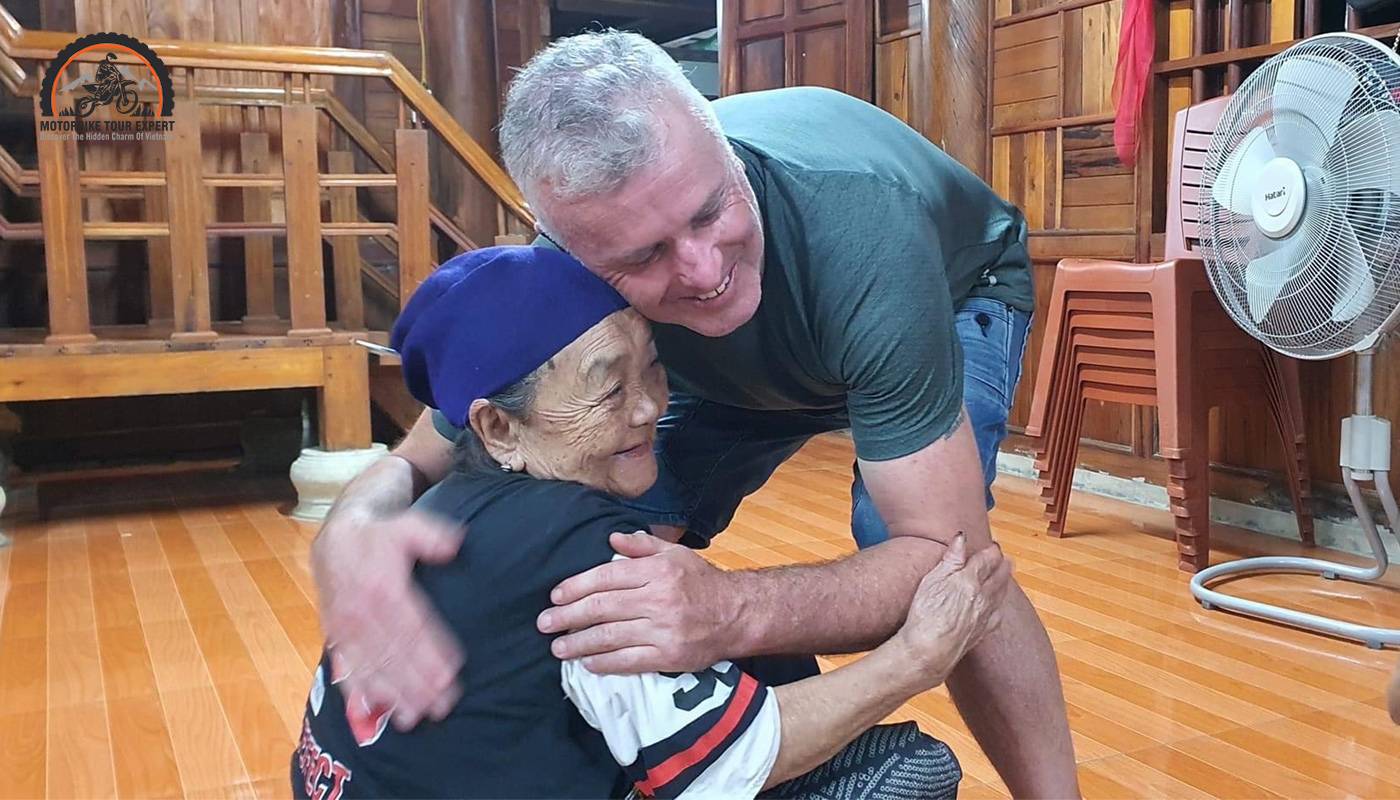
Greetings the older is considered necessary when traveling to Vietnam
Asking for direction/help
When you want to ask for directions, you can greet Vietnamese people (like the instructions above) first then ask them how to get to a certain place using the following structure:
“[The place that you want to get there] ở đâu ạ?” which means “Where is [address]?”
“Đi đến [address] như thế nào ạ?” means “How do I get to [address]?”
Alternatively, you can use the simpler structure as “Any location + o dau?” The word “o dau?” means “Where” in Vietnamese.
Say thank you and sorry
For beginners and who have the first time come to Vietnam, you can simply say thank you or sorry using the following sentences:
| Thank you and sorry in Vietnamese | English means |
| Xin cam on (Xin cảm ơn)! | Thank you! |
| Cam on nhe (Cảm ơn nhé)! | |
| Xin loi (Xin lỗi)! | I’m so sorry! |
| Cho toi xin loi (Cho tôi xin lỗi) |
Giving a compliment
You can give a compliment to Vietnamese by simply showing them a thumbs up or you can use the following simple sentences below here.
| Giving compliments in Vietnam | English meaning |
| No rat tot! (Nó rất tốt!) | It’s good! |
| Dep qua! (Đẹp quá!) | It is beautiful! |
| Toi rat thich (Tôi rất thích!) | I like it! |
| Ban rat dep (Bạn rất đẹp!) | You are so beautiful! |
| Mon an rat ngon! (Món ăn rất ngon!) | The food is so delicious! |
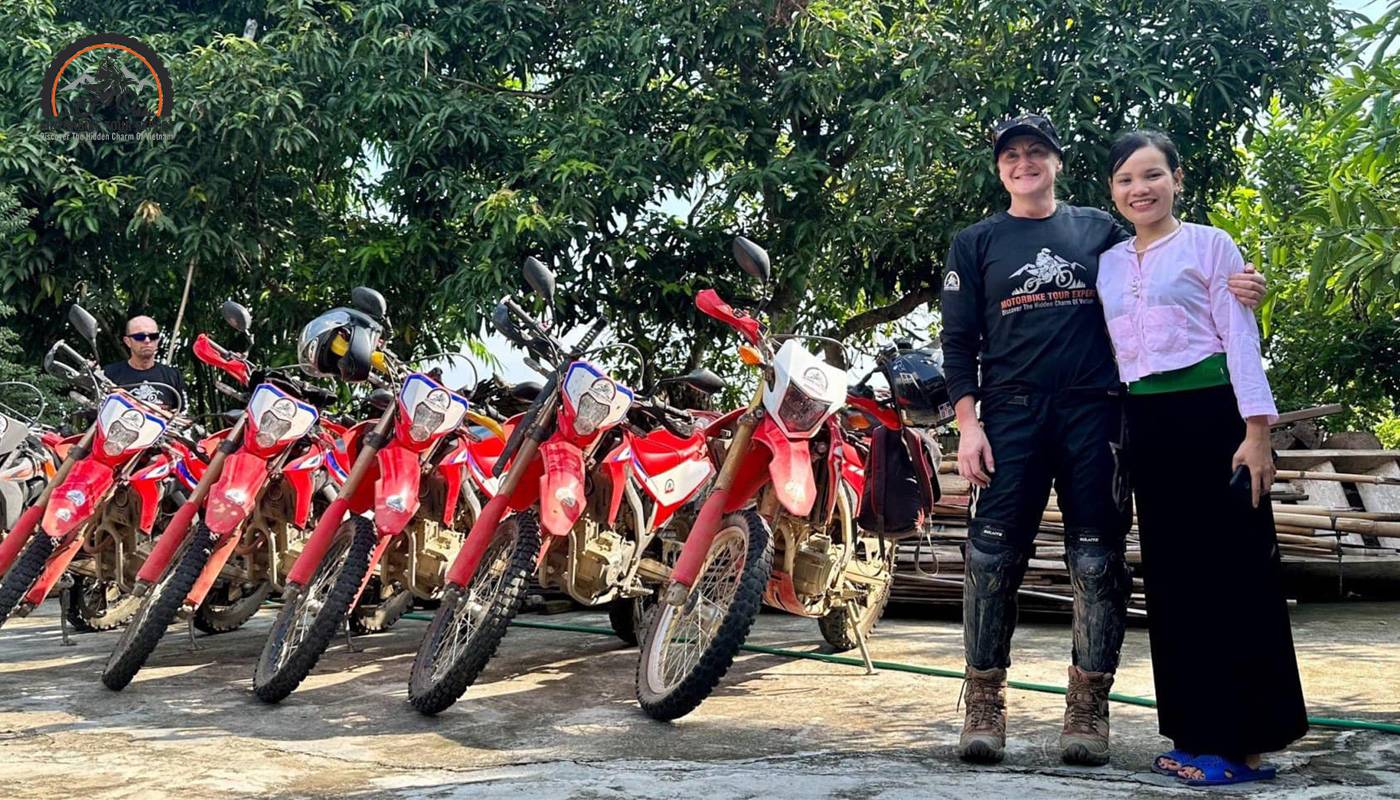
There are many ways to give compliments in Vietnam
Shopping in the market
Vietnam is famous for many food markets, Vietnamese dishes are diverse and delicious. In order to be able to communicate simply with locals or market traders, we provide you with some simple Vietnamese basic words and phrases so that you can have the best experience in Vietnam.
| Sentences for shopping in the Vietnamese market | The meaning in English |
| Cai nay bao nhieu (Cái này bao nhiêu?) | How much is it? |
| Toi muon cai nay (Tôi muốn cái này) | I want this! |
| Dat qua (Đắt quá!) | It’s too expensive! |
| Toi lay no (Tôi lấy nó!) | I’ll take it! |
| Toi muon cai nho hon (Tôi muốn cái nhỏ hơn). | I want the smaller one. |
| Toi muon cai lon hon (Tôi muốn cái lớn hơn) | I want the bigger one. |
Communication at a coffee shop or restaurant
Traveling Vietnam, you can experience the culture here by eating at the markets or restaurants in the area you visit. Besides the restaurants, you can also experience coffee shops in Vietnam to know more about our culture.
| Communicate at a coffee shop/restaurant | English meaning |
| Cho toi goi mon (Cho tôi gọi món)! | Order here! |
| Toi muon + the thing you want. | I want… |
| Cho toi menu. | Can I have a menu? |
| Toi doi qua (Tôi đói quá) | I am hungry. |
| Toi la nguoi an chay (Tôi là người ăn chay). | I’m vegan. |
| Toi di ung voi + the thing you are allergic to. | I’m allergic to… |
| It ngot nhe (Ít ngọt nhé) | Less sugar. |
| Khong da/khong duong (Không đá/không đường). | No ice/no sugar |
| Tinh tien (Tính tiền) | Check the bill, please |
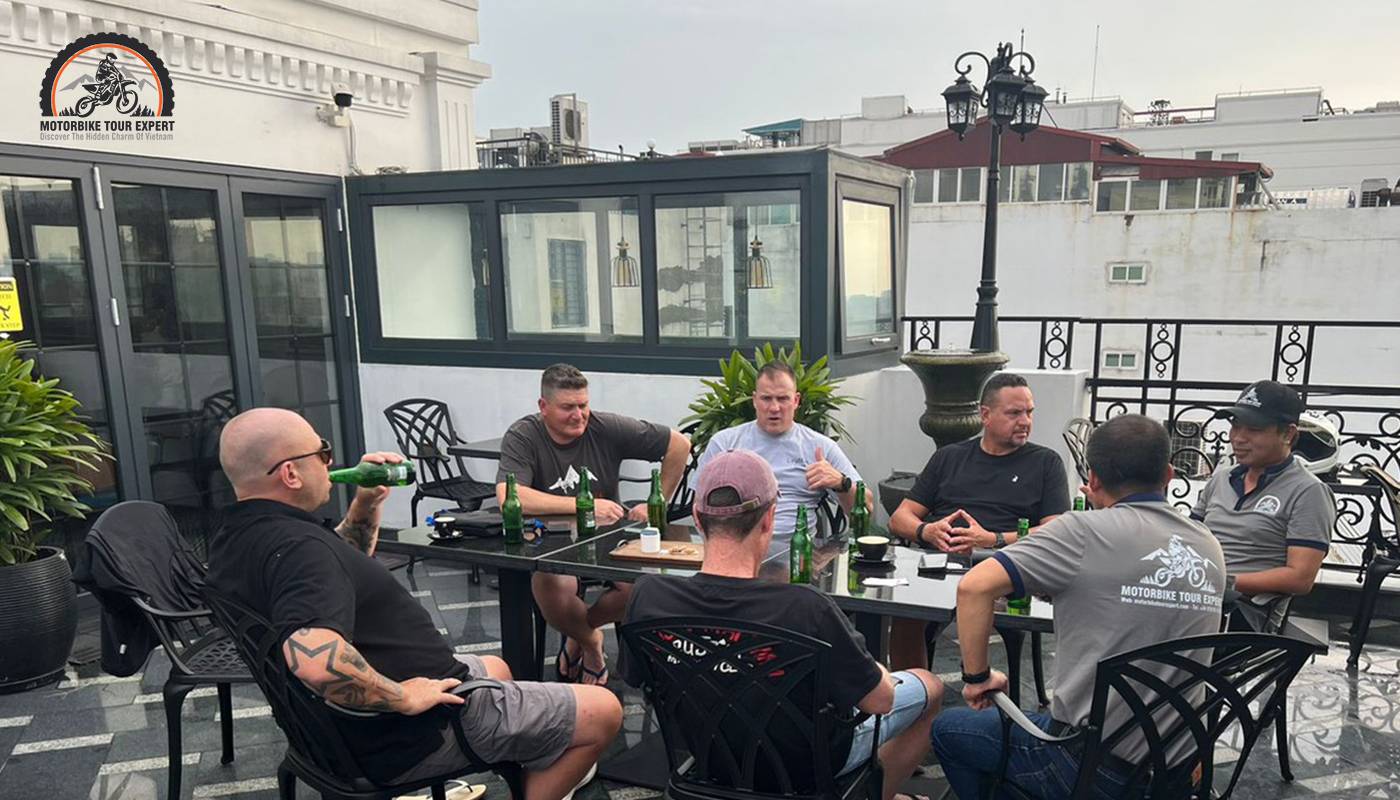
Vietnam restaurant industry is developing nowadays
Communication at the airport
In addition to basic Vietnamese for riders above, you can use the following sentences to ask for the easiest and fastest way to the airport.
- By using the structure: Toi muon den (I want to go) + The place you want to go to, you can ask for the way to come to the airport.
Counting numbers and the face value of money in Vietnam
Below are some of the most important basic Vietnamese phrases / words. Aware simple numbers as well as the face value of money not only help your payment easier but also make your trip more wonderful.
Counting numbers
The table below provides you with how to say and write some Basic Vietnamese Phrases of numbers.
| The numbers | How to write it | How to pronounce it |
| 1 | Mot (Một) | Moht |
| 2 | Hai (Hai) | Hai |
| 3 | Ba (Ba) | Ba |
| 4 | Bon (Bốn) | Bohn |
| 5 | Nam (Năm) | Nahm |
| 6 | Sau (Sáu) | Saw |
| 7 | Bay (Bảy) | Baie |
| 8 | Tam (Tám) | Tahm |
| 9 | Chin (Chín) | Chin |
| 10 | Muoi (Mười) | Muoy |
| 11 | Muoi Mot (Mười một) | Muoy Moht |
| 12 | Muoi Hai (Mười hai) | Muoy Hai |
| 13 | Muoi Ba (Mười ba) | Muoy Ba |
| 14 | Muoi Bon (Mười bốn) | Muoy Bohn |
| 15 | Muoi Lam (Mười lăm) | Muoy Nahm |
| 16 | Muoi Sau (Mười sáu) | Muoy Saw |
| 17 | Muoi Bay (Mười bảy) | Muoy Baie |
| 18 | Muoi Tam (Mười tám) | Muoy Tahm |
| 19 | Muoi Chin (Mười chín) | Muoy Chin |
| 20 | Hai Muoi (Hai mươi) | Hai Muoy |
The face value of money in Vietnam
Vietnam has many different face values of money. Check out the information about Vietnam’s face value and color so as not to confuse when using it.
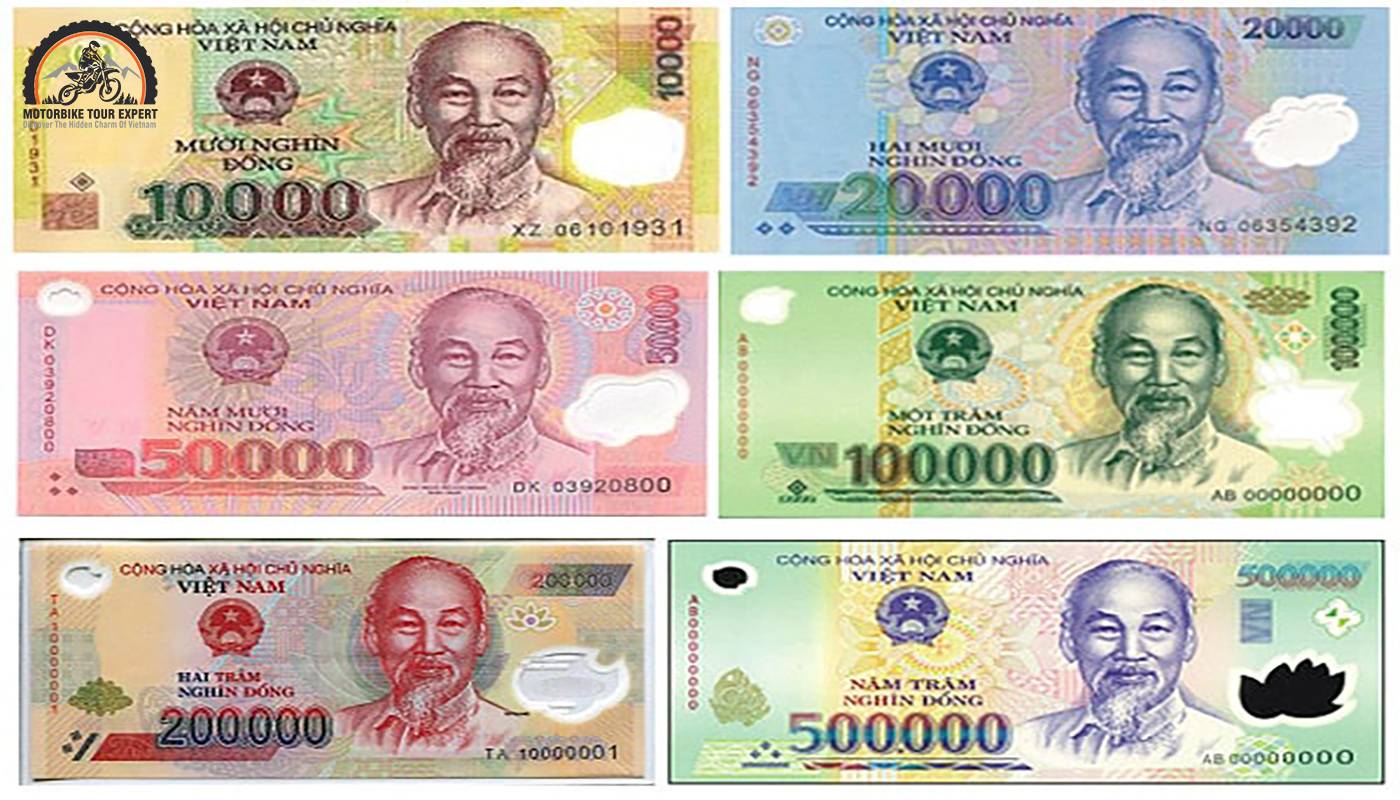
There are 6 face values of money in Vietnam
| The face values of money (VND) | How to pronounce it | The color of money |
| 10 000 | Muoy ngin | dark yellow |
| 20 000 | Hai muoy ngin | light blue |
| 50 000 | Nam muoy ngin | pink |
| 100 000 | Moht chahm ngin | green |
| 200 000 | Hai chahm | light orange |
| 500 000 | Nahm chahm ngin | blue |
Vietnam becomes more and more popular destination for tourist all over the world; however, most of the Vietnamese people are not good at speaking English or foreign languages so we hope some of these Basic Vietnamese Phrases will help you sometimes during your travel in Vietnam!
For the best experience of Vietnamese culture, history, and landscapes, please consider allowing us to be your local tour guides during your travels in Vietnam. Just join one of our Vietnam motorcycle tours here and enjoy Vietnam with our local guide team!
















